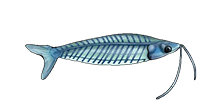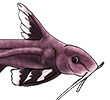Shift from slow- to fast-water habitats accelerates lineage and phenotype evolution in a clade of Neotropical suckermouth catfishes (Loricariidae: Hypoptopomatinae) by Fábio F. Roxo , Nathan K. Lujan, Victor A. Tagliacollo, Brandon T. Waltz, Gabriel S. C. Silva, Claudio Oliveira, and James S. Albert. PLoS ONE 12(6), June 7, 2017, pp. 1 - 17.
Abstract:
Identifying habitat characteristics that accelerate organismal evolution is essential to understanding both the origins of life on Earth and the ecosystem properties that are most critical to maintaining life into the future. Searching for these characteristics on a large scale has only recently become possible via advances in phylogenetic reconstruction, time-calibration, and comparative analyses. In this study, we combine these tools with habitat and phenotype data for 105 species in a clade of Neotropical suckermouth catfishes commonly known as cascudinhos. Our goal was to determine whether riverine mesohabitats defined by different flow rates (i.e., pools vs. rapids) and substrates (plants vs. rocks) have affected rates of cascudinho cladogenesis and morphological diversification. In contrast to predictions based on general theory related to life in fast-flowing, rocky riverine habitats, Neoplecostomini lineages associated with these habitats exhibited increased body size, head shape diversity, and lineage and phenotype diversification rates. These findings are consistent with a growing understanding of river rapids as incubators of biological diversification and specialization. They also highlight the urgent need to conserve rapids habitats throughout the major rivers of the world.
Open access at : http://journals.plos.org/plosone/articl ... ne.0178240
Lineage and phenotype evolution in a clade of Neotropical suckermouth catfishes (Loricariidae: Hypoptopomatinae)
-
lfinley58
- Expert
- Posts: 723
- Joined: 04 Jan 2003, 19:16
- I've donated: $90.00!
- My articles: 3
- My images: 3
- Spotted: 3
- Location 1: Margate
- Location 2: Florida USA
- Interests: Catfishes (all), Aquarium History




